What else is eating your chickens feed?
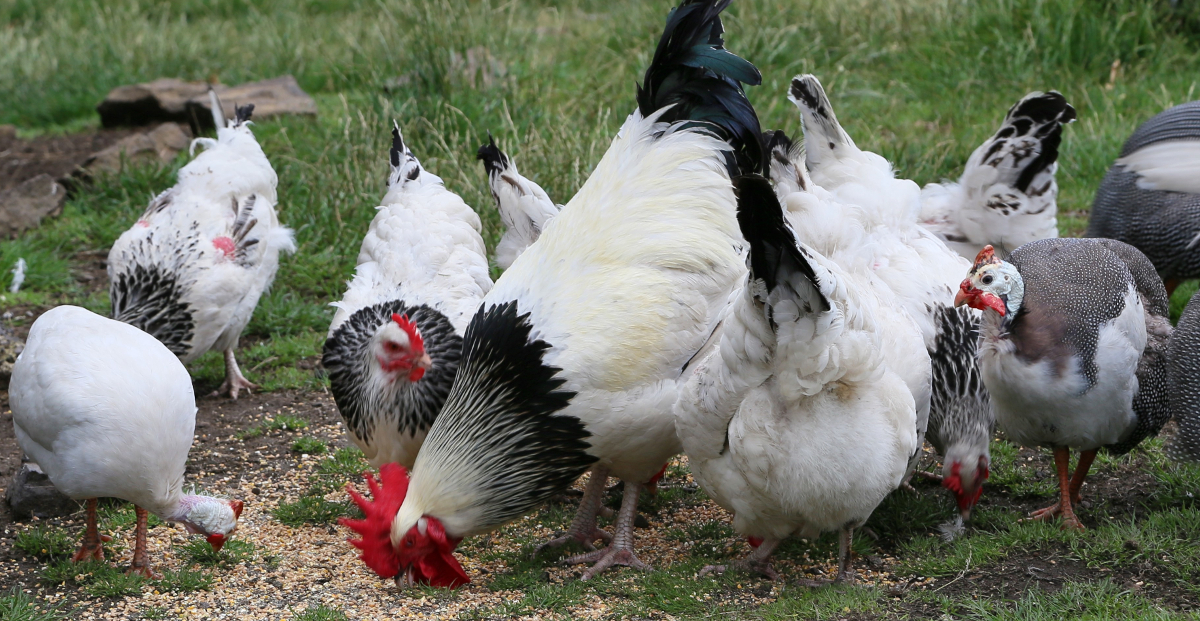
Chicken feed is a coveted feed-stuff and it's quite surprising how many other things will have a free feed at your expense.
The trouble is that they cost you money and might easily bring in diseases. They might also contaminate the food with faeces.
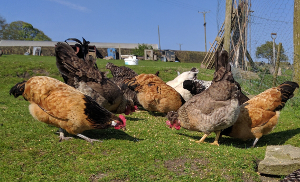
Chicken feed is attractive to a great many other animals like wild birds and rodents.
I expect you have realised you are getting through way to much chicken feed. It's the sort of problem that creeps up on you and you don't really notice till it gets to be an expensive issue.
I have come across poultry keepers losing as much as 50% of their chicken feed to wastage and loss to other creatures and if you are out at work all day you just may not notice.
This is a list of the animals most likely to be eating your chickens feed.
- Rats and mice.
- Wild birds.
- Rabbits.
- Squirrels.
- Chipmunks.
- Farm animals.
- Insects.
1. Rats and mice. Seldom both as mice will tend to avoid rats. Rats reproduce at an amazing rate and will demolish feed and the feeders they're in. They need to gnaw all the time to keep their teeth in good order and do a tremendous amount of damage.
Wild rats carry fleas, ticks, bacteria and viruses all of which can cause disease. Rats are instinctive and will kill and eat anything they can from your feed to your chicks and even your full grown chickens.
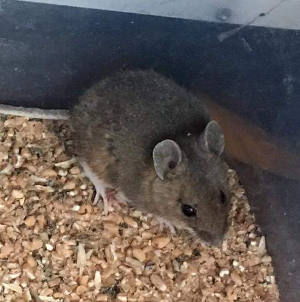
Above: This is a mouse that has got into the feed bin.
Once rodents have a dependable food source they begin to look out for suitable nest spots nearby. They will find anywhere warm and cosy and can climb walls to get into roof spaces as well as under floors and sheds.
Rats and mice come because there is food, water and shelter. They are numerous and are the number one suspect if something is eating your chickens food.
2. From the wren to the mallard and all wild birds in between free meals will go down very nicely thank you. The wren occupies a similar niche in the environment to a mouse and feeds on similar goodies. I have had wild mallards near me gorge themselves so much on my all seed feed that they cannot fly out of the pens.
3. Bunnies and rabbits will happily demolish seed or pelleted feed and can consume a surprising quantity.
Solution: Rabbits are kept out by good fences that go below ground level.
4. Squirrels are tenacious and destructive and will chew through wood easily to get to a free feed indoors.
Having worked in a remote location in the catering trade I can safely say that squirrels will eat almost anything. And they will go to considerable lengths to get, including gnawing their way through wooden doors.
You think you see the same squirrel each time, but they look alike, so it may be many more.
Squirrels carry ticks on them as well as other parasites and have huge appetites and will teach their young about your feeder so the problem will not go away.
In the UK grey squirrels are considered vermin and it is illegal to release one if you catch it. Below is one helping itself. If the feed is not on display it will damage the feeder as well.
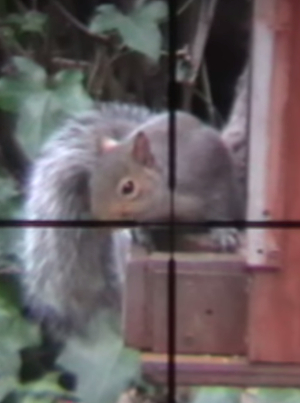
Solution. The only solution is to dispatch the culprit. Otherwise it will teach it's offspring and you will have a real problem. Find a shooting club and somebody with an air rifle or .22 will do the job, maybe for nothing.
Trying to remedy the situation by keeping squirrels out will only give short term relief.
5. Chipmunks. We don't get these in the United Kingdom so I'm relying on advice from a US keeper and sadly it seems that these the little cuties are just as bad as any rodent for the damage they do and the parasites they carry.
Keeping chipmunks out of chicken feed involves a combination of trapping and building rodent proof chicken runs.
6. Farm animals. I have experience with sheep, horses, cattle and pigs, all are escape artists if they want to be and all will empty feeders given half a chance. Chicken feed is fatal to horses and most farm animals as it swells inside them until their digestive tract bursts.
I once had 16 sheep wedged inside a chicken shed that was 6 x 8 foot. The door opened inwards and they were packed in so tight we had to take the side off the shed.
Solutions: Sturdy fences topped with barbed wire. Pigs are strong and stubborn and will also eat as many eggs as they find. Any farm animal will try to get to feed concentrates.
7. Insects. This is more of a problem with weevils and other bugs eating their way through stored feed rather than consuming it once it has been put out for the hens. It is still a loss and can easily contaminate a batch or sack of feed and make a big dent in it's nutritional value.
Solution: Store in robust containers with air tight lids.
Winter can make a difference. when it is frozen or snowy and there is little natural food about in the wild everything will make a beeline for the nearest feed source.
Does Feed Type Matter?
Some animals prefer seed based feed to pellets but a hungry rats or squirrel will eat anything and farm animals are used to being fed pelleted feed so no, the type of feed doesn't make a difference.
All feed should be stored in a cool, dry and dark place and only put out the amount the hens need for the day.
Manufactured and pelleted feed are more prone to spoilage than others as they include added fats and nutrients. These additives can make it more attractive to some species.
Should I leave feed out all day for the chickens?
I leave the feed out at all times. As do most chicken keepers I know.
Free feeding results in the birds getting as much feed as they need, typically around 4 oz each depending on the breed and size of the bird.
However I do make sure that there is not any feed left over at the end of the day.
How do I stop wild birds eating my chicken food?
Sometimes it seems like you have just been feeding the crows and it seems never ending. The corvite family of which this ex-jackdaw is a member are very clever. I always handle wild birds with a litter picker as they can have lice and fleas.
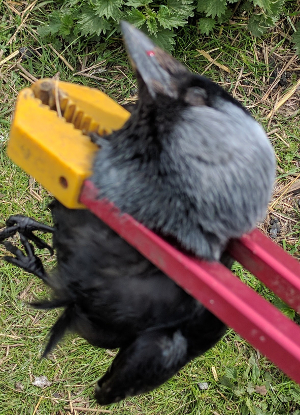
Once wild birds have found the food source they will keep returning. The secret is to keep it out of their line of sight from day 1 and they never learn where it is.
It is worth noting that all the creatures mentioned in this article also have a need for water and if you live in a dry location that can be a problem as well. I personally like the galvanised bucket waterers that just present a slit of water to the chickens.
So what can you do stop animals other than your chickens eating the feed. You will probably need to use a combination of two or more tactics to outwit some food thieves.
How to stop vermin and other animals eating your chicken feed:
Remember if you shoot or trap animals you need to do it humanely and not let them suffer or you could be prosecuted.
These ideas are in no particular order and some may not be suitable for everyone or to their taste.
- Automatic or treadle feeders - I tried a treadle feeder and for the most part wild birds and rodents no longer eat my chicken feed. I did once find a mouse in mine when I went to fill it up one morning but that is the exception rather than the rule. You do not have to worry about injuries to the chickens. Despite using their treadle feeders tens of thousands of times over the last few years or so, no chicken ever got their head in the lid.
- A routine change - feed in the morning and evening and don't leave wastage lying around. Giving your chickens a distinct feeding time may work but only if they are allowed on the range to find their own food at other times.
- Secure fences that go a foot or so underground and with flags or stones around the edges. Covered runs will keep everything out if designed properly and built to a standard.
- Covered feeders keep things out of sight. Most birds are sight hunters
- Shooting them. This is a good idea for squirrels. You do not need to do it yourself just find a contact at a shooting club and ask.
- Trapping. Traps exist for most species. Make sure you have a plan for dealing with whatever you catch. Releasing vermin is illegal in most countries and birds can travel considerable distances to get home.
- Scare them with plastic owls or hawks.
- Get a cat
- Try a smaller door with chicken flap. This is a curtain over the door cut into strips of material that hang down. The chickens will get used to it and it will keep out other birds. Except maybe the corvite family, crows and such as they are very clever . I made one with layers of strips of old denim and it could be made with just about anything. It effectively keeps small birds like sparrows as well as doves and pigeons out of the coop.
- Try hanging a wild bird feeder in the front yard. this may distract the wild stuff away from your poultry.
How many times a day should I feed my chickens?
How often you feed chickens is a matter of personal preference. Below is some of my Silver Laced Barnevelder bantams getting some sprouts in the afternoon.
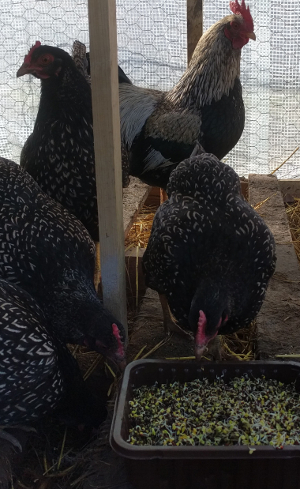
I feed mine in the morning and top up later in the day as they are preparing to roost. This means mine have a good feed when they are let out, they then free range all day and get another feed before bed time.
Birds that roost hungry and without a full crop will suffer in the long run so there needs to be enough food on hand.
You can feed them as little or as often as you have time for. As I work full time that is the beginning and end of the day.
Should you put food and water in chicken coop at night?
No, the birds have no need for it and the only thing that will be eating it overnight is the rats and mice.
You can feed and water in the coop provided they can't spill and make a wet mess. This has the advantage of keeping the food out of the line of sight of wild birds.
Your chickens should roost naturally when they have fed in the evening and any surplus should be removed.
